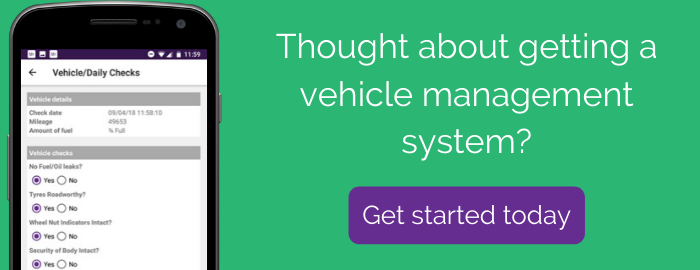There are 31.2 million cars registered for use on UK roads with every tenth vehicle on the road now being a light commercial vehicle (LCV).
With the amount of commercial vehicles growing rapidly year on year there is a growing concern for the safety of workers on the roads and the proper maintenance of vehicles.
The prevention of accidents can be a swift and simple process, an efficient and effective way of ensuring the roadworthiness of vehicles is by performing regular vehicle checks.

Who is responsible for commercial vehicle checks?
Ultimately, it is the vehicle operators duty and obligation for maintaining the vehicles’ roadworthiness, however, it is usually the operations or fleet manager who is responsible for implementing and regularly reviewing the company’s vehicle check procedure.
When to check your vehicle and how often
Vehicle checks should be instilled into a daily routine, before mobile workers start their jobs.
Short checks that may appear like a minor inconvenience to mobile workers can have huge repercussions when not completed. A system is needed to ensure vehicles are safe to drive, and can help to reduce road fatalities and accidents.
What you should check
Walk around checks are now becoming the standard when businesses are operating with a fleet of vehicles. The types of the checks that workers should carry out on a daily basis consist of:
- Oil leaks
- Tyres
- Wheel fixings
- Bodywork
- Safe load
- Mirrors
- Wipers/wash
- Brakes
- Horn
- Steering
- Lights
- Mileage
Although it may seem like an extensive list of checks to complete, in reality this would only take a matter of minutes. Daily checks can be the difference between life and death on roads, so 5 minutes every day is the least drivers can do to ensure their safety and that of others. Further, businesses should be doing everything within their means of accident prevention on roads and enforce a process of vehicle checks.
How businesses enforce vehicle inspections
High growth in the use of commercial vehicles has now resulted in businesses needing a way to enforce a process of vehicle inspections, to better ensure the safety of their workers when they are out on the roads.
Businesses are now switching to job management systems, like MyMobileWorkers, as a way to implement a fixed process that workers must follow before starting their daily jobs.
These systems offer vehicle inspections, whereby workers log into an app and have to complete the checks before they can access their daily jobs. If any of the questions are failed an alert will be sent straight to the office, ensuring the safety of workers.
All checks, like the ones listed above, can be built into a required checklist. For further safety, enforced photos can be taken of the vehicle so that office teams can see any problems and have regular updates of the vehicle.
This differs greatly from manual processes, as manual/paper checklist can be completed by drivers at any point during the day. Managers can’t be sure that the vehicle checks have been completed at all or have an accurate time when they were performed, which leads to difficulties when attempting to disprove liability and completing audits.
A digital system keeps managers safe in the knowledge that mobile workers have done everything within their means of accident prevention and can carry out all of their jobs successfully.


